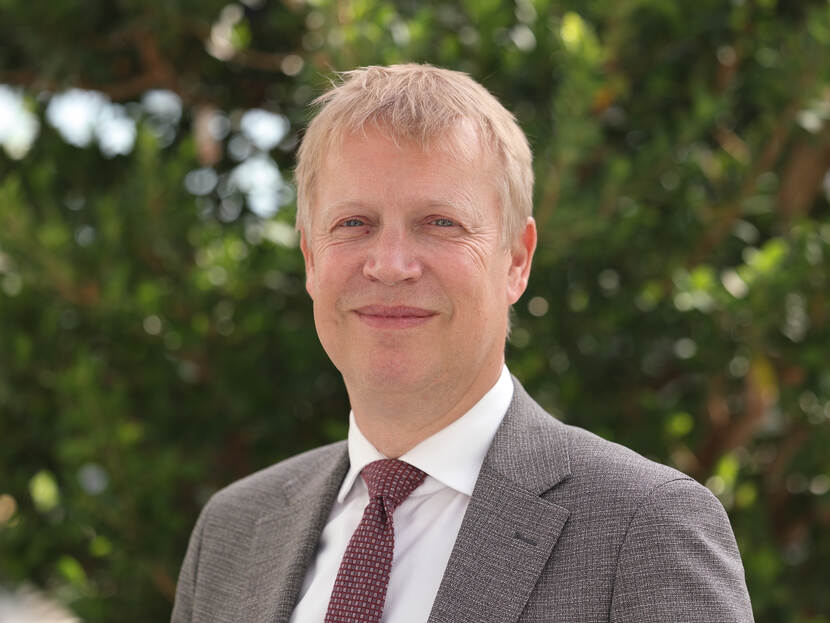Climate knowledge by distance learning
The Academy has expanded its range of e-learning activities so more staff, including those at the missions, can stay up to date about current topics and learn wherever and whenever it suits them. In 2024, Jan Willem Naphegyi-Schouw (our senior learning adviser) and Jantinus Smallenbroek (former policy officer at the Inclusive Green Growth Department) jointly developed the e-learning course on climate change for all central government staff in international roles.

In 2024, the Academy for International Relations took digital learning and knowledge-sharing to the next level. One of the highlights was the development of the Climate Change e-learning course in partnership with the Inclusive Green Growth Department (IGG) (which develops international policy on climate, water, food security and energy) and the Teletrain educational consultancy. This interactive online course covers international climate policy and treaties, as well as the link between climate policy and trade and development. It is open to all central government staff in international roles, who can learn at their own pace.
Demand-driven design
The starting point for this e-learning was the growing need among staff for accessible, up-to-date knowledge on climate. After all, climate change is increasingly connected with diplomatic work, whether in economic missions, policy advocacy or development programmes. For the Academy, e-learning courses are ideal as a way to quickly meet demand for learning activities on specific issues, provided there is an evident learning need, sufficient content expertise is available, and the target group is well defined. The existing e-learning course was due for an update.
Accessible, flexible and modular
E-learning courses offer flexibility in time, place and learning pace. This is a great advantage for staff at missions worldwide or in busy jobs. The Climate Change e-learning course is modular, so participants can choose the topics that are relevant for them: from general climate knowledge to specific topics such as the Intergovernmental Panel on Climate Change (IPCC), the relationship between trade and climate, and mainstreaming climate in development programmes. Supplementary in-depth material is also available via the online library at 247Plaza.
Collaboration – the key to success
The collaboration between the Academy and IGG was intense and positive. ‘In a short time, we agreed on the content, made choices about the focus of the modules, and involved various experts,’ says Jan Willem. ‘We’re building a sustainable learning solution for the long term, that can easily be updated and will be integrated with broader learning pathways on climate and sustainability. And by co-designing with Teletrain from the start, we’ve been able to translate the content directly into a didactically sound and visually appealing learning experience.’
‘The intake meeting with the Academy went very well. Creating an e-learning course demands a lot of time from everyone involved. That’s something to seriously consider. Fortunately, in the final months I could devote an average of two full days a week to its development,’ Jantinus says.

From idea to reality
Jan Willem continues, ‘The development process unfolded in steps; from concept development and storyboard to writing scripts and building modules, to testing and launching them. It was a challenge to present complex information – such as climate policy concepts and instruments – in a way that a learner would understand. By using clear examples and visualisations, we made things more accessible. It was also important to closely coordinate the input provided by the various content experts.’
Jantinus adds, ‘At first, there was some confusion about what exactly I was supposed to deliver. Teletrain’s job was to convert the content provided by IGG into a didactic format – an e-learning script, as it were. It seemed like a lot of extra work, but we found out that formulating several learning goals helped us keep the course focused.’
User experience and future plans
‘The initial responses from colleagues have been positive,’ says Jan Willem. ‘They especially appreciate the in-depth content, and the flexibility and clarity of the modules. Around 80 staff members have now started the course, especially the general knowledge module, as we expected. The Academy asks participants to give feedback via an evaluation form so that we can see where there is room for any improvement.’
‘The Academy plays a key role in managing the process and finances. It would be good to have an annual consultation with IGG to discuss the need for any additions or adjustments to the content,’ Jantinus adds.
Aftercare and assurance
‘The Academy’s work isn’t done once an e-learning course goes live. We make sure that the course is easy to find through on the learning portal, repeat the publicity campaign about it and advise staff with questions. We also stay in touch with IGG to ensure the course content stays up to date.’